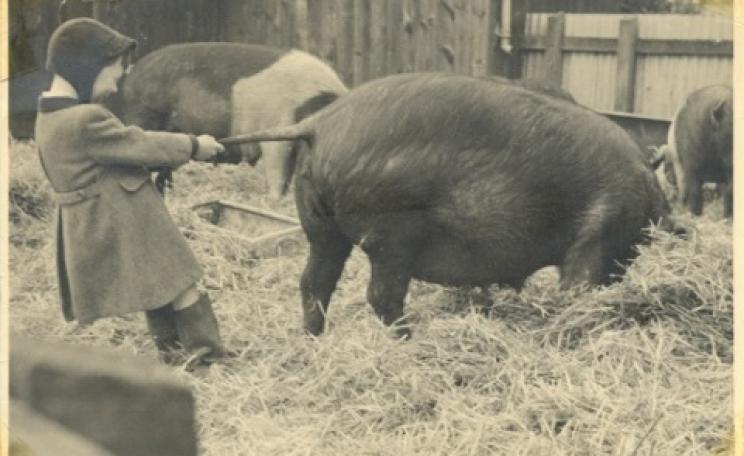=
There is little doubt that food systems and the natural world will come under ever-increasing pressure in the coming decades.
Without concerted action, existing cropland soils will become even more degraded and less resilient to weather extremes. Subsistence farmers in the drylands will also continue to degrade soils as they and the livestock on which they depend are pushed onto more marginal, brittle land.
Farmers tend to get the blame for this, but look a little closer and it becomes clear that the degradation caused by their over-stocked animals is often the result of developed and developing countries continuing to acquire, by fair means or foul, more and more of their better land to grow food for their own burgeoning populations back home.
Reducing consumption
At the same time, unless we are very careful, yet more of the last remaining natural habitats, such as rainforest and savannah grasslands – home to some of our most iconic and threatened wildlife – will be converted to food production, principally soya beans, palm oil, sugar and maize, with devastating impacts on the environment and biodiversity.
Over recent years, a large number of reports, which have considered at least some of these issues, have almost all come to the similar conclusion that we need to reduce our consumption of meat, because feeding grain directly to humans is more efficient than feeding it indirectly, via farm animals producing meat or milk.
Almost without exception, these reports recommend cutting beef and lamb production and consumption. Some additionally recommend cutting dairy consumption, but many also recommend either leaving chicken and pork consumption at current levels or actually increasing it, as recently recommended by the UK’s Committee on Climate Change.
Underlying these conclusions is evidence that demand for meat is growing in developing countries, as some of them become more affluent and adopt Western-style diets, where meat consumption is already high.
However, if current projections are correct, it is clear that the planet will not be able to produce enough grain to feed the animals to meet this demand, without destroying more of the natural world. From this has developed the concept of introducing a tax on meat to reduce its consumption.
Methane emissions
Ruminants produce the greenhouse gas methane, of which the levels in the atmosphere are about twice as high as they were before the industrial revolution.
Chickens do not produce methane and pigs produce only small amounts, though the manure from housed cattle, pigs and poultry can also result in some methane emissions, especially if not well managed. Methane is a much more potent greenhouse gas than carbon dioxide.
Beef and lamb are considered unhealthy meats by some nutritionists, because about half of the fats they contain are saturated.
Studies consistently show a small increased risk of bowel cancer and some other diseases in people who eat a lot of processed red meat, but the evidence on red meat itself is less clear with some studies appearing to find a small link between high red meat consumption and diet-related disease and many other studies finding no such a link.
Two teams of researchers now have found that people who eat red meat have lower levels of disease than people who do not, when – and this may one of the keys to explaining the confusion – both meat-eaters and those who don’t eat meat, also have an otherwise healthy diet.
Meat tax
With much of this in mind, the idea of a meat tax was recently debated at a meeting organised by the Food Ethics Council (FEC), a charity founded with the help of a donation of £100,000 from the late Joanne Bower.
Joanne’s life was, and continues to be, an inspiration. She cared passionately about farm animal welfare, about farming in harmony with the precious beauty of the natural world and all the creatures and plants that inhabit it.
One of her long-standing concerns was that we needed a committee on ethical standards in farming and food production. She proposed this to successive administrations, but as she couldn’t get any Government to establish one, she did what she could to set it up herself, giving half of the money she had saved over the decades on behalf of the Farm and Food Society, by never charging for her time while running it.
Overall, I’m sure she would have been delighted by the quality of the FEC’s meat tax debate.
While the SFT shares the same serious concerns as other campaign groups, government committees and many scientists, our analysis of the issues, especially in relation to methane, saturated fat and red meat (as part of a healthy diet) leads us to significantly different conclusions about how to address these problems.
Small farms
Our primary concern is that a meat tax would force the last small family farms in the UK out of business, to be replaced by fewer, larger farms using more intensive farming methods.
The main reason for this is that small to medium-sized beef, lamb and dairy farmers are already struggling to survive; allowing for inflation, prices of meat and dairy are historically low. The financial pressures on British livestock farmers as a result are severe.
Problems with mental health are rising in an occupation normally associated with mental wellbeing. On average, more than one farmer a week commits suicide, and agricultural charities are buckling under far more requests for help than they can meet.
A meat tax would only exacerbate this. When you make a tiny profit on every animal you rear, the only practical options for most producers are to sell up or keep a lot more animals and cut costs by intensifying.
The SFT fears this would result in more mega-pig and poultry farms, increased use of grain and soya, and more dairy cows kept indoors on concrete and not allowed out to graze; with all this, is a reduced quality of life and greater use of feed additives, including antibiotics.
Sequestering carbon
We believe that researchers make the mistake of assuming that all red meat is the same in terms of its impact on the environment and human health, regardless of the way animals are farmed.
It is also clear that most of those who call for big reductions in ruminant numbers in the UK fail to understand the key role they play in maintaining our pastoral landscapes and soil fertility and biodiversity.
One interesting example of this misunderstanding is that several studies have found that grass-fed cattle tend to produce more methane than cattle eating grain.
But if you use this to conclude that feeding them on grain is no worse and maybe better than feeding them on grass, you overlook the loss of soil carbon from land producing grain, and the extent to which grasslands sequester and store carbon in their soils.
A further, recent example, is that research from Oxford University reassessing the impact of methane on global warming shows that, contrary to established scientific assumptions, because the gas is short-lived, we only need to make small reductions in emissions to achieve zero warming, rather than the dramatic reductions needed in the long-lived greenhouse gases, carbon dioxide and nitrous oxide.
Arguably these could more easily be made by the fossil fuel industry – the biggest source of methane emissions, as well as carbon dioxide.
Tipping the balance
A similar paradox occurs when comparing pork and chicken with beef and lamb. Chickens produce no methane and convert grain to protein much more efficiently than cattle and sheep.
But pig and poultry diets are heavily based on grain and imported soya, the production of which causes many environmental issues, particularly relating to deforestation and use of chemical inputs.
Cattle and sheep, however, are far more efficient at converting grass to protein than pigs and poultry.
As we can grow grass in much of the UK where we can’t grow grain, this tips the balance in their favour. Two-thirds of our farmland is in fact under grass, most of this for sound environmental and agronomic reasons.
If we don’t make the best use of this land to produce food, we will need to increase our protein and fat imports even more and, as a result, be responsible for more rainforest destruction and even more indigenous people being evicted from their ancestral lands because they have no documented land rights.
Incentivising habits
Taxing foods considered unhealthy or environmentally damaging has increasingly been promoted as an effective way to incentivise better eating habits.
There is mounting evidence to suggest that this can work, when proper care is taken: perhaps the best results to date have come from countries which have introduced taxes on sugary drinks, like Mexico.
However, implementing a tax on food requires absolute certainty that reducing consumption of the targeted food group will bring about overwhelmingly positive benefits. With sugary drinks, which pose a major public health challenge, there is almost unanimous agreement that this is the case.
We cannot say the same about the production and consumption of red meat in the UK, where most (though not all) is reared on grass, with all the environmental and health benefits that this brings.
This Author
Richard Young is policy director of the Sustainable Food Trust.





